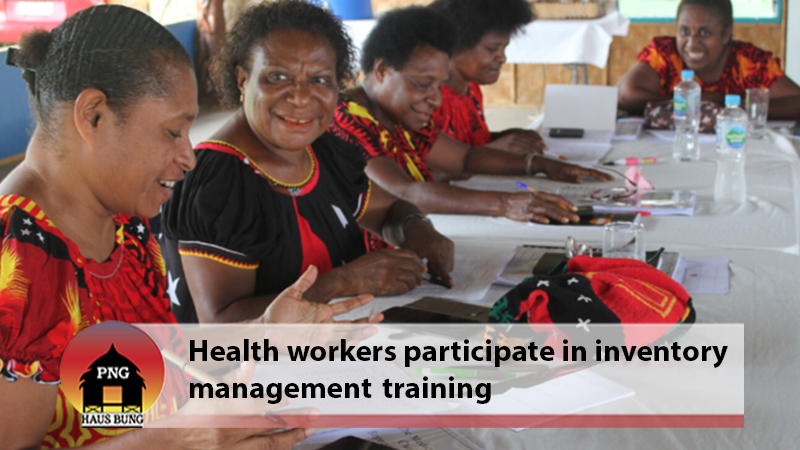A young woman walks 10 hours to reach the district health centre.
She is pregnant and has gone into labour.
Health care workers are available but their shelves and their stores are empty.
If there are complications, what help can they provide? This scenario may be familiar to some people in Papua New Guinea.
The experience of walking to a health facility only to see a sign announcing that there is no medicine available for even simple illnesses may be familiar to many more.
An inventory management training, conducted by UNFPA in partnership with the National Department of Health, Provincial Health Authorities and with support from the Australian Government, seeks to fill these empty shelves.
“Most of our health workers are not well oriented with reproductive health commodities including drug management, stock taking, maximum and minimum drug ordering, and things like that,” said Judith Takura, the Family Health Services Coordinator for East Sepik Provincial Health Authority.
Lifesaving reproductive health medicines, contraceptives, and medical equipment are needed to provide family planning, reproductive health, and essential obstetric care services.
UNFPA has supported the National Department of Health in conducting a national Assessment for Reproductive
Health Commodities and Services that looked at the availability of these commodities at health facilities around the country.
The results uncovered a health system in crisis. Jennifer Simon, Family Health Services Coordinator for the Madang Provincial Health Authority, said that stock management was a concern in her facility.
“Looking at the results of the national Assessment for Reproductive Health Commodities and Services, I was able to learn more about the weaknesses in our Health Centers, especially in the dispensary and how poorly managed it is,” she said.
“Health workers lack knowledge and training in stock management.”
The inventory management training considers not only stock-outs – the absence of a particular medicine or medical device – but also over-supply.
Ordering too much of a medicine can create problems as the medicine may expire before it can be used. Small facilities may also lack the proper storage space for excess medicines, such as fridge space for medicines that must be kept cold.
With limited resources, the facility may not have funds available to replace expired or improperly-stored medicine.
Striking the balance between under- and over-supply requires careful calculation of the needs of the health facility, based on accurate population estimates, and awareness of the storage requirements, expiration dates, and delivery times of different commodities.
“Through this workshop most health workers will be able to implement what they have acquired and make a difference in their health centers,” said Ms Simon.
Ms Takura agreed, noting the importance of ongoing on-the-job support.
“I plan on ensuring that my staff here at this workshop are further trained in dispensary management,” she said.
This is the latest in a series of activities designed to bridge the gaps in a complex medical supply chain that includes procurement from international manufacturers and suppliers, effective national and sub-national medical stores, distribution to different levels of health facilities, and stock management at dispensaries at hospitals and health centres.
Effective supply chain management is critical to ensuring every Papua New Guinean is able to access reproductive health medicines and services.
“These workshops are designed to strengthen the systems that allow the procurement, distribution, quality storage and safe usage of essential medicines and medical devices in particular, reproductive health commodities,” said UNFPA’s Debbie Kupesan said.
“Also, it helps health workers understand how the medicines ordering system works in PNG and understand the importance of their role as part of the team involved in the medicines supply chain.”
A further three training sessions are scheduled to be held over the coming weeks at Sorgeri for health workers in the Southern Region, followed by New Guinea Region health workers in Kokopo,and finally health workers in the Highlands Region in Mt Hagen.
For the many women who give birth or seek FP services in Papua New Guinea every day, a properly filled stock cardmay mean that their healthcare worker can reach for a dose of life-saving medicine, instead of an empty shelf.
UNFPA and Reproductive Health Commodities UNFPA works with the National Department of Health (NDoH) to address the unmet need for family planning and reduce maternal mortality and morbidity.
Through support to midwifery in-service training and equipment, procurement and distribution of contraceptives and reproductive health commodities, support to the Certification in Basic Pharmaceutical Management course for Pharmacy Assistants, and sexual and reproductive health advocacy, UNFPA’s partnership with NDoH focuses on strengthening local expertise in delivering improved health services Papua New Guinea.
With support from the Australian Government, UNFPA has completed a national Assessment for Reproductive Health Commodities and Services to assess the availability and quality of essential reproductive health commodities and quality of family planning and maternal health services in primary, secondary, and tertiary facilities across the country.
In addition, UNFPA procured $730,000 USD of reproductive health commodities in 2022 with support from UNFPA Supplies and mobilized $260,000 USD for strengthening the supply chain and health system in PNG

